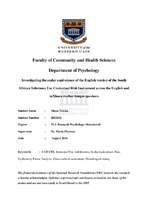Investigating the scalar equivalence of the English version of the South African Substance Use Contextual Risk Instrument across the English and isiXhosa mother tongue speakers
Abstract
There is an overwhelming concern about substance use amongst adolescents across the world, especially in low socio-economic status communities. The South African Substance Use Contextual Risk Instrument was developed to capture the contextual risk factors for adolescents in low socio-economic status South African communities. This study is part of a larger study which aimed to develop and conduct the initial validation of the instrument. In piloting the instrument, both English and isiXhosa mother tongue speakers were tested using the English version since the instrument is only available in English. The equivalence of the measure across the English and isiXhosa mother tongue speakers is however unknown. The purpose of this study is therefore to assess the scalar equivalence of the English version across the English and isiXhosa mother tongue speakers. The total sample was 674 consisting of 420 English and 247 isiXhosa language groups from low socio-economic status communities in Cape Town. The study employed the Hoteling’s T square test (to assess significant difference of means between the groups), the equality of reliabilities (to assess the significance of differences between the scale reliabilities) and the Tucker’s Phi coefficient of congruence (to assess the congruence of the construct across the two groups). In assessing the mean differences, the results revealed that there were significant mean differences, with the isiXhosa-speaking group performing significantly lower than the English-speaking group for most of the scales. Internal consistency was also generally lower for the isiXhosa group. The structural congruence revealed that there was incongruence between the two language groups for most of the scales with an exception of two of the twenty one scales. It can thus be concluded that the measure cannot be accepted as structurally equivalent across the two groups. It is clear that bias exists in the majority of the scales of the SASUCRI and that this version is thus not applicable for an isiXhosa speaking sample. The study recommends that the instrument is adapted for the isiXhosa speaking group.

